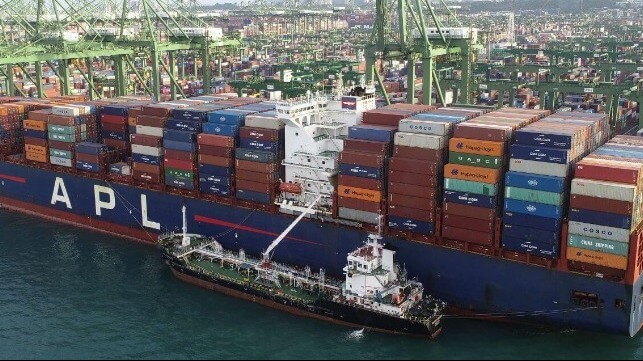DNV: Biofuels to Be Significant but Not Only Decarbonization Solution

In a new analysis of the role of biofuels in shipping, DNV concludes that while they can play a significant role in decarbonizing shipping, it is unlikely that biofuels will be the only solution to shipping’s goals to transition to zero GHG emissions. The analysis highlights the need for a major build-up in the production of sustainable biofuel while citing current limitations in production capacity, short-term supply constraints, and longer-term competition from other sectors for the supply of biofuels.
DNV highlights the strong growth in the use of biofuels noting that as a drop-in fuel they present an alternative for ships to reduce emissions without having to make large capital investments. The report examines from various reports the use of biofuels for bunkering in Rotterdam and Singapore concluding that nearly three times as much blended fuel is in use as pure biofuel.
In addition to the relative ease of use of biofuels, DNV points to regulatory developments, such as the EU Emissions Trading System, as providing a strong incentive for biofuels. They highlight as the shipping industry prepares to meet regulations requiring decarbonization, biofuels – in the form of methane, methanol, or fuel oils – are viewed as one method to achieve the goals for the reduction of CO2 emissions. Biofuels and biomass are already becoming highly sought after by various sectors with shipping competing with cooking, water and space heating, as well as timber and pulp and paper production, all of which are likely to compete for the available supplies of biofuel.
“Biofuels are poised to play a notable role in the decarbonization of shipping. Nevertheless, existing constraints on production capacity and competition from other sectors is likely to impact short-term supply to the maritime industry,” said Eirik Ovrum, Principal Consultant in DNV Environment Advisor.
DNV estimates that the current global production capacity of sustainable biofuels is around 11 million tonnes of oil equivalent (Mtoe) per year. They believe that by 2050, the production capacity could reach a range of between 500 to 1,300 Mtoe annually.
“To fully decarbonize shipping using biofuels, in combination with energy efficiency measures, an annual supply of 250 Mtoe of sustainable biofuels is required by 2050. This would represent 20 to 50 percent of potential global production,” of biofuels writes DNV. As a result, they say, biofuels are unlikely to be the only solution.

that matters most
Get the latest maritime news delivered to your inbox daily.
“A major build-up of sustainable production capacity is needed before biofuels can reach their full potential,” concludes Ovrum. “Thus, shipping’s goal of decarbonizing will need to be achieved in combination with energy efficiency measures as well as use of other low carbon fuels alternatives.”
DNV’s white paper takes a closer look at the challenges by exploring the potential role of biofuels in enabling the decarbonization of shipping. They also explore the necessary preparations before integrating biofuels onboard vessels.
